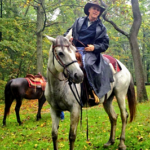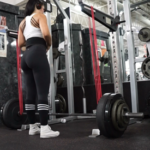
It seems summer is almost here in eastern North Carolina: The thermometer hit 70 a few times this past week. While the large maple in our backyard budded and the lawn sprouted, I sighed. Seventy-degree weather is fantastic, but experience tells me it won’t stop there.
Gone are the cold days and romantic, roaring fires in the wood stove. Gone are the surprise snow storms and driving with the windows open. Soon here are the sweltering summer days, struggling air conditioners and me, baking like a loaf of bread every time I get in the car.
I’ve never been a hot weather guy, but since everything else in eastern North Carolina is nearly perfect, I do my best to make it through the summers. Besides, maybe it’ll help me sweat off a few extra pounds.
In addition to a change in weather, the new season also brings with it a new farm routine–though for us it’s the transition between routines that’s the toughest, especially with regard to blanketing.
One day the weather may be 66 degrees and rainy. At night, the temperature drops to a damp 44 degrees. The next day it’s 60 but bright and sunny.
It’s not warm enough to turn out the horses at night, but almost too warm to blanket during the day, though we don’t want the horses’ coats to bleach in the sun. And dealing with the borderline weather is exacerbated by the fact that some blankets are on their last legs come the end of winter.
Things that put blankets on their last legs: 1. Rips, tears and shredding.
“Look, Dad!” Justin shouted. “I got racing stripes!”
Justin jogged around in a circle as I approached his pasture. His blanket had new tears down each side.
“Wow,” I said flatly, “and they match. How did that happen?”
“It wasn’t easy!” Justin responded as he broke into a gallop. “Zoooooom!” he shouted as he ran down the fence line. “Vander, you were right! I can go a lot faster now!”
I shot Vander a look as I headed to the barn for the duct tape. Vander looked up at the trees as if he were bird watching and then casually walked away.
2. Disassembly.
Some disassembly is unavoidable. For example: losing a rubber grommet from the T-shaped clip on a belly surcingle. Then the surcingle comes unclipped every time the horse shakes or rolls. Usually you only notice this once you’re inside your house, freshly showered and wearing clean clothes.
Then you change back into your barn clothes (unless, like us, you spend your entire day in barn clothes) and return to the pasture to fix the surcingle. Once in the pasture, however, you realize that the grommet is still in place and that the surcingle’s clip is securely closed.
It is, in fact, the other side of the surcingle–the side that was, until very recently, expertly stitched into the blanket and now flaps lifelessly in the breeze.
“How did this happen?” I asked Vander as I waved the orphaned surcingle before his eyes.
“Those things just fall off,” he responded, taking a slow sip from the water trough. “We really need better blankets.”
“This used to be the most expensive blanket in the barn!” I shouted.
Again, Vander looked up at the trees as if he were bird watching and then casually walked away.
Other forms of blanket disassembly are less mysterious.
“Madison!” I exclaimed. “Where is your tail flap?”
I glanced at Brownie, who stood behind Madison with a bright blue tail flap hanging from his mouth. I held my hand out and gestured for Brownie to come closer. He walked to me and dropped the flap into my open hand.
“Those things just fall off,” Brownie said. “I saw you coming and picked it up for you. We really need better blankets.”
“Yeah!” shouted Justin. “We need better blankets!”
“Justin,” I said, “duct tape will stick to smart-alecky horse muzzles, too.”
“Zoooooom!” Justin shouted as he galloped away.
Disassembly can also lead to other problems.
3. Full blanket removal.
“It rained last night,” Kimberly said. “I though you blanketed Mandy.”
“I did,” I responded as we walked towards Mandy’s pasture.
Mandy glanced up at us as she picked at the new shoots of pasture grass. In a distant corner of her pasture lay a crumpled and soiled mass. Kimberly walked over to retrieve it.
“What happened to your blanket?” I asked Mandy.
“That thing just fell off,” she responded, looking annoyed.
“The tail strap broke off from the D-ring!” Kimberly shouted from across the pasture, holding up the sad, mud-coated blanket.
“We really need better blankets!” Mandy added.
I glanced up at the trees as if I were bird watching and then casually walked away.
If not caught early, certain cases of blanket removal may prove frightening for the horse, and fatal for the blanket.
4. Full blanket removal, followed by blanket stomping, chewing, biting and thorough destruction.
“Don’t forget to throw Justin some more hay when you get home from work,” Kimberly’s voice message instructed me. She was checking in from her horse show.
It was dark when I arrived home, so I drove the car down to the barn and parked with the headlights illuminating Justin’s pasture.
Justin was standing near the gate, pawing at a dirty white, fluffy pile. What was it? It hadn’t snowed in weeks. I was worried that some dangerous–potentially toxic–trash had blown into Justin’s pasture.
I left the car door open as I ran to and threw myself over the fence. Justin didn’t seem to notice me, the car headlights, or anything else.
“Take that!” he snorted. “And that!” He kicked and tore at the white, fluffy pile with his front feet. Then I saw something shiny and metallic from deep within the pile.
“Whoa!” I shouted. “Hold on! Stop!”
As I leaned in toward the pile of dangerous and toxic trash, I saw a surcingle and a tag on which was printed “size 63.”
“Holy cow!” I shouted. “This pile used to be your blanket!”
“I’m chilly!” Justin remarked with a shiver.
No amount of duct tape was going to save this barely 2-week-old blanket. Two of the three belly surcingles were ripped off, the tail flap was shredded, and the nylon lining was in tatters. And the giant pile of mud-stained fluff barely resembled the blanket’s former layer of cozy, insulating fiberfill.
“That blanket tried to get me!” Justin said, kicking at the pile a few more times.
I picked up what remained of the blanket by the back end. The tail strap was missing.
“The tail strap came off,” I remarked.
“I know,” said Justin. “But it wasn’t easy!”
“Come on,” I said, grabbing him by his halter. “Let’s put you inside.”
“Zooooo–“
“No ‘zoom,'” I said, holding him back. “Let’s just walk.”
“Awww…”
As we walked towards the barn, I wondered exactly how many blankets we’d gone through over the years, and how many more we’d go through in the coming years.
It would soon be time to wash the surviving winter blankets, fold them and put them away for the summer.
I just didn’t have the heart to tell Justin about fly sheets.
Jeremy Law and his wife, Kimberly, live on a small farm in North Carolina. Read Jeremy’s other columns in EquiSearch.com’s Humor section.







